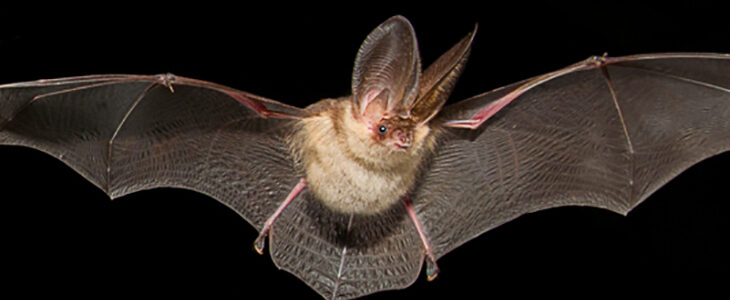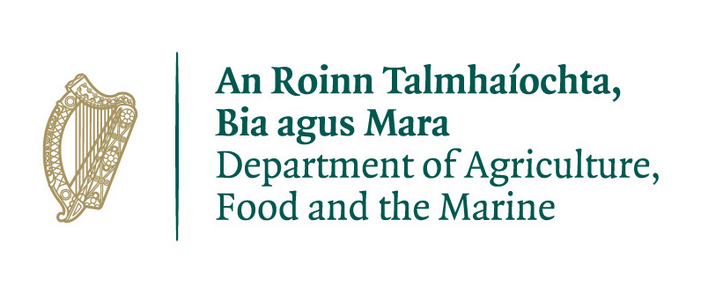
Bats
Common pipistrelle, Soprano Pipistrelle Nathusius' pipistrelle, Brown long-eared bat, Daubenton's bat, Natterer's bat, Whiskered bat, Leisler's bat, Lesser horseshoe bat, Brandt's bat
There are 10 species of bats in Ireland. Bats are insectivorous mammals and are capable of consuming a large number of small winged insects prey on nightly hunting trips so they are a good form of natural pest control.
The main threats to the species comes from changes in the wider countryside resulting in the fragmentation and loss of foraging habitat and roost sites
The increased use of pesticides in agriculture in recent decades has had a negative effect on the number of available insect prey, and toxic accumulation of chemicals within the environment can also poison bats over time.
Disturbance at and interference with their roost sites can adversely impact on bat species
The practice of chemical treatments of timber frames in attics which can poison an entire colony and make the area unsuitable for bats for up to twenty years.
The planting of trees and woodlands will in the future provide foraging and roosting opportunities for bats.
The increase in the number of artificial water bodies will also provide foraging habitats, particularly for the daubenton’s and soprano pipistrelle bats although poor water quality can affect the availability of their aquatic insect prey.
Bat Crimes
All bat species are protected by law in the Republic of Ireland under the Wildlife Acts 1976 to 2012.
They are also protected under the European Communities (Birds and Natural Habitats) Regulations 2011, as they are species listed in Annex IV of the EU Directive 92/43/EEC (Habitats Directive) as species requiring strict protection.
The lesser horseshoe bat is additionally listed in Annex II of the Habitats Directive as a species whose conservation requires the designation of Special Areas of Conservation
Without the appropriate licence granted by the Minister for the Arts, Heritage and the Gaeltacht under the Wildlife Acts, 1976 to 2012 or derogation licence under the European Communities (Birds and Natural Habitats) Regulations 2011, it is illegal to:
- Hunt a bat of any species
- Deliberately capture or kill any specimen of bat in the wild
- Be in possession of any bat (whether alive or dead) or any part, product or derivative of a bat
- Keep, transport, sell, exchange, offer for sale or exchange any specimen of bat taken in the wild
- Take or make photographic, video or other pictures of a bat on or near its breeding place
- Wilfully interfere with, damage or destroy the breeding or resting place of any bat
- Deliberately disturb bat species particularly during the period of breeding, rearing, hibernation and migration
Wildlife Licensing Unit,
Department of Housing, Local Government and Heritage
National Parks and Wildlife Service
90 King Street North
Dublin 7
D07 N7CV
Email: wildlifelicence@npws.gov.ie
Call 01 888 2000
Recording evidence at the Crime Scene
Assessing whether a criminal offence has taken place may not always be straight forward and other possibilities such as natural deaths, predation and legal hunting should be considered.
If you come across a wildlife crime scene or a dead bird or object that may be related to a wildlife crime, every piece of information is – or might be – important, but it needs to be recorded properly and accurately for the authorities to have a chance of prosecuting an offender.
Before you do anything else it is very important that:
- You do NOT put yourself in danger by approaching anyone you suspect of committing a crime – they may be violent and/or aggressive.
- You do NOT touch any dead birds or animals. They may be poisoned baits or victims of poisoning. Many poisons (e.g. Carbofuran) are extremely dangerous to us as well as wildlife in even very small amounts and can be absorbed through the skin.
- You do NOT disturb the scene by walking around unnecessarily – small pieces of evidence (cigarette ends, footprints, the marks left by a spade etc) may be lost or trampled into the mud or grass.
- You do NOT move any items at the scene – unless asked to do so or an animal or human”s welfare is/may be compromised by leaving it at the scene.
- You do NOT mark the site (e.g. with a white plastic bag) Although being able to see a marker from a distance might sound like a good idea, it will also alert an offender that someone has been at the site and they might go back and remove evidence.
- You do NOT do anything illegal yourself – leave crime to the criminals!
Record the date and time
- Record the transport
Do this as soon as possible, as suspects can be traced from the registration number
Photograph/write down any vehicle registration numbers that are or might be related to the incident. It is legal to record a registration number if you suspect that the vehicle has been or may be used in a crime. - Record the person
Recording the offender’s face is important of course, but their clothing, the bags they’re carrying, the equipment they’re using are all important too. - Record the scene
Take photographs or video of the scene using a mobile phone or camera etc (or make as accurate a sketch as possible). - If possible try to cover any items, perhaps with vegetation, to make them safe; but make sure you don’t disturb the crime scene in the process!
- If photographing an object, try to put something beside it for scale (e.g. a coin or notebook) providing it won’t disturb the crime scene.
- Record the location
It is particularly important to record locations accurately (apps that provide GPS data are available for most smartphones)
In an urban area note the address or a description of the location. In the countryside take wide angle photographs of any landmarks; a tree, a distinctive fence line, a hill. - Even if in doubt take a photograph and email it to the National Parks and Wildlife Service WildlifeEnforcement@npws.gov.ie
Reporting a bat crime
To report suspected illegal bat activity contact the National Parks & Wildlife Service
Tel: (01) 888 2000
Contact numbers for your local NPWS Conservation Ranger HERE
If you can’t reach NPWS personnel call An Garda Síochána:
If the crime is in progress or about to happen, or if the offender is still at the scene or has just left call 999 or 112
If the event is finished then contact the National Bureau of Criminal Investigation on envi.wildlife.crime@garda.ie and call your local Garda Station (Garda Stations Directory) or the Garda Confidential Telephone Number 1800 666 111
[Although it will assist the NPWS and Gardaí if you provide as much information as possible, you do not have to give your name if you ring to report an incident.]
| If the bat is alive and is injured, also, call a wildlife rehabilitator/vet from the contacts page of Irish Wildlife Matters |
Irish Wildlife Matters |
| If you witness any crime involving a bat please also contact | Bat Conservation Ireland |

